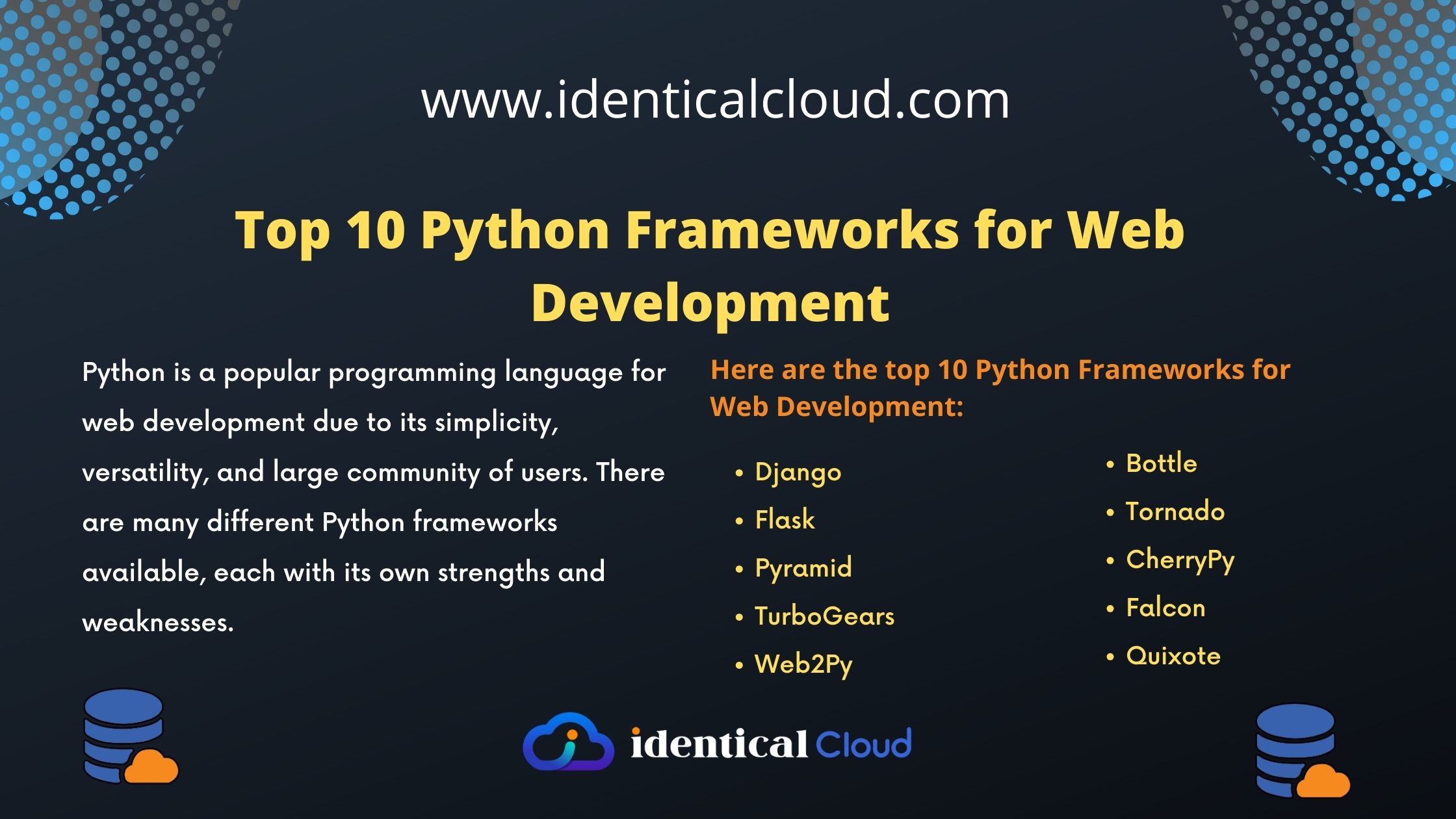
Top 5 Python Libraries for Web Development
Top 5 Python Libraries for Web Development
Python is a popular programming language that is known for its simplicity and versatility. It is used for a wide variety of tasks, including web development. There are many Python libraries that can be used for web development, each with its own strengths and weaknesses.
Here are the top 5 Python libraries for web development:
Django
Django: The Full-Stack Framework
Django is a high-level web framework that empowers developers to build robust web applications quickly. Known for its “batteries included” philosophy, Django offers a range of built-in features such as an ORM (Object-Relational Mapping), authentication system, URL routing, and an administration interface. It follows the DRY (Don’t Repeat Yourself) principle, ensuring efficient code reuse and rapid development. Whether you’re creating content-rich websites or complex back-end systems, Django’s comprehensive toolkit makes it a go-to choice.
Here are some of the benefits of using Django:
- Quick to develop with: Django provides a lot of features out of the box, such as templating, routing, and authentication. This makes it quick and easy to develop web applications with Django.
- Highly scalable: Django is designed to be highly scalable, so it can be used to build large and complex web applications.
- Secure: Django comes with a number of security features, such as CSRF protection and password hashing. This helps to keep your web applications secure.
- Active community: Django has a large and active community of developers who are constantly creating new features and libraries. This makes it easy to find help and support when you are using Django.
If you are looking for a Python web framework that is quick to develop with, highly scalable, and secure, then Django is a good choice.
Here are some of the features of Django:
- Model: The model layer is responsible for storing and retrieving data from the database.
- Template: The template layer is responsible for rendering the HTML pages of the application.
- View: The view layer is responsible for handling requests from the user and returning a response.
- URLconf: The URLconf is responsible for mapping URLs to views.
- Form: The form layer is responsible for creating and validating forms.
- Middleware: The middleware layer is responsible for intercepting requests and responses and performing tasks such as authentication and authorization.
- Testing: Django comes with a built-in testing framework that makes it easy to test your web applications.
Django is a powerful and versatile web framework that can be used to build a wide variety of web applications. It is a good choice for beginners and experienced developers alike.
Flask
Flask: Micro Yet Mighty
Flask is a micro web framework that provides the essentials for web development without imposing too much structure. Its simplicity and flexibility make it an excellent choice for small to medium-sized applications. Flask allows developers to choose the components they need, and its modular nature encourages the use of extensions for added functionality. If you’re looking for a lightweight framework that lets you design your application your way, Flask is the answer.
Here are some of the benefits of using Flask:
- Simple: Flask is a very simple framework, which makes it easy to learn and use.
- Flexible: Flask is very flexible, which allows you to build web applications that meet your specific needs.
- Extensible: Flask is extensible, which means that you can add new features and functionality to your applications.
- Community: Flask has a large and active community of developers who are constantly creating new features and libraries. This makes it easy to find help and support when you are using Flask.
If you are looking for a Python microframework that is simple, flexible, and extensible, then Flask is a good choice.
Here are some of the features of Flask:
- Routing: Flask uses the Werkzeug library to handle routing.
- Templating: Flask uses the Jinja2 library to handle templating.
- Sessions: Flask uses the Werkzeug library to handle sessions.
- Testing: Flask comes with a built-in testing framework.
- Deployment: Flask can be deployed to a variety of platforms, including Heroku, AWS, and Google Cloud Platform.
Flask is a powerful and versatile microframework that can be used to build a wide variety of web applications. It is a good choice for beginners and experienced developers alike.
FastAPI
FastAPI: Speed Meets Web Development
FastAPI is a relatively new entrant that has taken the Python web development world by storm. It combines speed and modern features to create APIs quickly. Its automatic generation of OpenAPI and JSON Schema documentation streamlines the development process, making it a hit among developers who need efficient, well-documented APIs. Built on top of standard Python type hints, FastAPI provides auto-completion and validation, saving time and reducing errors.
Here are some of the benefits of using FastAPI:
- Fast: FastAPI is very fast, on par with NodeJS and Go (thanks to Starlette and Pydantic). It is one of the fastest Python frameworks available.
- Easy to use: FastAPI is easy to learn and use, even for beginners. It has a simple and intuitive syntax that makes it easy to write clean and concise code.
- Flexible: FastAPI is very flexible, which allows you to build APIs that meet your specific needs. It supports a wide range of features, such as Swagger, OpenAPI, and automatic documentation.
- Extensible: FastAPI is extensible, which means that you can add new features and functionality to your applications. It has a large and active community of developers who are constantly creating new extensions.
If you are looking for a modern, fast, and easy-to-use Python web framework, then FastAPI is a good choice.
Here are some of the features of FastAPI:
- Automatic documentation: FastAPI generates automatic documentation for your API, including Swagger and OpenAPI specifications. This makes it easy for your users to understand how to use your API.
- Routing: FastAPI uses the Starlette library to handle routing.
- Templating: FastAPI does not have a built-in templating engine. However, you can use the Jinja2 library to add templating to your applications.
- Sessions: FastAPI uses the Starlette library to handle sessions.
- Testing: FastAPI comes with a built-in testing framework.
- Deployment: FastAPI can be deployed to a variety of platforms, including Heroku, AWS, and Google Cloud Platform.
FastAPI is a powerful and versatile web framework that can be used to build a wide variety of APIs. It is a good choice for beginners and experienced developers alike.
Pyramid
Pyramid: Flexibility and Power
Pyramid is a versatile web framework that offers flexibility while still being powerful. It’s well-suited for projects of various sizes, from small applications to large, complex systems. Pyramid doesn’t enforce a specific development approach, allowing developers to choose their preferred components and tools. With robust support for customization and scalability, Pyramid is a solid choice for building web applications tailored to your specific needs.
Here are some of the benefits of using Pyramid:
- Flexible: Pyramid is very flexible, which allows you to build web applications that meet your specific needs. It supports a wide range of features, such as templating, routing, and authentication.
- Extensible: Pyramid is extensible, which means that you can add new features and functionality to your applications. It has a large and active community of developers who are constantly creating new extensions.
- Community: Pyramid has a large and active community of developers who are constantly providing support and guidance. This makes it easy to find help and support when you are using Pyramid.
If you are looking for a versatile and extensible Python web framework, then Pyramid is a good choice.
Here are some of the features of Pyramid:
- Routing: Pyramid uses the Pylons Router to handle routing.
- Templating: Pyramid uses the Jinja2 templating engine.
- Sessions: Pyramid uses the Werkzeug library to handle sessions.
- Authentication: Pyramid uses the Pyramid-AuthTkt package to handle authentication.
- Testing: Pyramid comes with a built-in testing framework.
- Deployment: Pyramid can be deployed to a variety of platforms, including Heroku, AWS, and Google Cloud Platform.
Pyramid is a powerful and versatile web framework that can be used to build a wide variety of web applications. It is a good choice for beginners and experienced developers alike.
Tornado
Tornado: Asynchronous Powerhouse
Tornado is a web framework and asynchronous networking library designed for handling long-lived connections efficiently. It’s often used for applications that require real-time capabilities, such as chat applications, IoT dashboards, and live data streams. Tornado’s non-blocking architecture ensures high performance and responsiveness, making it an excellent choice for applications that demand concurrency.
Here are some of the benefits of using Tornado:
- High performance: Tornado is very fast and efficient, making it a good choice for high-traffic web applications.
- Asynchronous: Tornado is asynchronous, which means that it can handle multiple requests at the same time. This makes it a good choice for applications that need to handle a lot of concurrent requests.
- Scalable: Tornado is scalable, which means that it can be easily scaled to handle more traffic.
- Easy to use: Tornado is easy to use, even for beginners. It has a simple and intuitive API that makes it easy to write clean and concise code.
If you are looking for a high-performance, asynchronous, and easy-to-use Python web framework, then Tornado is a good choice.
Here are some of the features of Tornado:
- Asynchronous: Tornado is asynchronous, which means that it can handle multiple requests at the same time. This is done by using non-blocking I/O operations.
- Routing: Tornado uses the WSGI protocol to handle routing.
- Templating: Tornado uses the Jinja2 templating engine.
- Sessions: Tornado uses the Werkzeug library to handle sessions.
- Testing: Tornado comes with a built-in testing framework.
- Deployment: Tornado can be deployed to a variety of platforms, including Heroku, AWS, and Google Cloud Platform.
Tornado is a powerful and versatile web framework that can be used to build a wide variety of web applications. It is a good choice for beginners and experienced developers alike.
Python’s versatility and expansive library ecosystem make it an excellent choice for web development. Whether you’re aiming to build large-scale applications with Django, embrace the simplicity of Flask, harness the speed of FastAPI, explore flexibility with Pyramid, or dive into asynchronous capabilities with Tornado, these top five Python libraries have you covered. As you embark on your web development journey, these libraries will empower you to create applications that are efficient, scalable, and aligned with your specific requirements.










